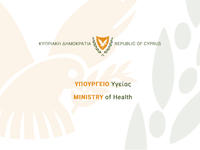Press Releases

05-05-2021 13:46
The Pharmaceutical Services provide answers to frequently asked questions about the vaccines against COVID-19
1. How do vaccines work against COVID-19 disease?
In general, vaccines act by preparing the human immune system (the body’s natural defenses) in order to recognise specific viruses and protect against them and the disease they cause.
Most of the research into vaccines against COVID-19 is to induce a response of the human organism against a specific protein found only in the SARS-CoV-2 virus (coronavirus) which causes the COVID-19 disease. An immune response is created when a person is vaccinated. If the person is later infected with the SARS-CoV-2 virus, the immune system is able to identify it and is already prepared to attack it.
2. Could I contract SARS-CoV-2 because of the COVID-19 vaccine?
No. None of the COVID-19 approved and recommended vaccines by the European Medicines Agency contains the live SARS-CoV-2 virus, which causes COVID-19 disease.
COVID-19 vaccines teach the immune system how to recognise and fight the virus that causes COVID-19 disease. Sometimes this process can cause mild symptoms, such as fever, headache and myalgia. These symptoms are normal and indicate that the human body develops protection against the virus.
3. I may be vaccinated and still get sick with COVID-19? And since the vaccine doesn't offer 100 % protection from the coronovirus disease, why should I be vaccinated?
The data available so far show that vaccines reduce the risk of symptoms and the risk of serious virus disease. This is very important because it reduces at the same time the risk of hospitalisation, the risk of loss of human lives and the risk of long-term complications caused by the virus in some patients, such as cardiovascular and respiratory complications.
All vaccines approved by the European Medicines Agency so far provide high efficacy. They reduce the likelihood of someone suffering from COVID-19 disease and protect against serious or fatal complications of the disease. However, because no vaccine is 100 % effective, a small proportion of fully vaccinated individuals may get SARS-COV-2 and become sick with COVID-19 even after receiving all the required doses of the vaccine.
In addition, after the administration of the 1st or 2nd dose of the vaccine it takes a few weeks to develop immunity and be protected. This means that it is possible for a person to contract the coronavirus, shortly before or shortly after receiving the vaccine, and to become sick. This is because the vaccine did not have sufficient time to develop the necessary immune protection.
4. How long does the vaccine protection against COVID-19 last? Should I repeat a booster dose of the vaccine after completion of the COVID-19 vaccination?
Based on the data available so far, we do not know the duration of protection that vaccines against coronavirus offer us. The duration of protection provided by vaccination is expected to be longer than the natural immunity acquired after the natural infection.
Persons who have been vaccinated in the framework of clinical trials will continue to be monitored in order to obtain more information on the duration of protection and whether and when a booster dose will be needed. In addition, with the vaccination of more people, we expect to have more data on the duration of the immunity offered by the vaccine.
5. Can a positive result be produced in a test for the detection of the virus due to receiving the COVID-19 vaccine?
No. None of the COVID-19 approved and recommended vaccines produces a positive result in a test for the detection of coronavirus (molecular method of PCR or rapid test). The coronavirus detection test is used to determine whether someone is infected with the virus itself.
After vaccination one may have a positive result on some antibody tests due to an immune response of the body. Antibody tests indicate if someone is infected with the coronavirus and has been ill and that there is, possibly, some level of protection from the virus.
6. I've been exposed to SARS-CoV-2 or COVID-19. Do I need to get vaccinated?
According to current recommendations, a person should be vaccinated regardless of whether he or she has already contracted the coronavirus, as it is likely that he/she may be infected again. Previous illness with COVID-19 disease may provide some protection, known as natural immunity, which however does not seem to be enough to protect against a potential re-infection with the virus. Current data suggest that recontamination with SARS-CoV-2 virus is not common in the months following the initial infection but may increase over time.
Vaccination following an illness with COVID-19 is carried out within three (3) months after recovery and after at least 42 days after recovery/seranegacy in diagnostic tests. In people who have been seriously ill and treated with specialised therapies, it is recommended that vaccination is carried out after 90 days. In any case, it is recommended that people who have been ill and wish to be vaccinated consult their Personal Physician.
7. Do vaccines with mRNA technology affect my DNA?
No. Messenger RNA (mRNA) is not the same as DNA and cannot be combined with our DNA to change our genetic code. The mRNA contained in the vaccine does not enter the nucleus of the cell where our DNA is located. It simply commands our cell to produce a special virus protein against which our immune system then reacts and is eventually trained to react to the virus.
8. Could adverse side effects occur in the future due to COVID-19 vaccines?
COVID-19 vaccines are safe and protect against severe infection and death from COVID-19 disease. Some mild side effects, which may occur after vaccination, are indications that the body develops immunity.
Side effects usually occur in the first days after receiving the vaccine. Most are mild or moderate in intensity and retreat within a few days. In some cases, they may be more serious or last longer.
Serious side effects that could cause long-term health problems are extremely unlikely after any vaccination, including COVID-19 vaccination. Monitoring of vaccines has historically shown that adverse reactions generally occur within six (6) weeks of receiving the vaccine dose.
Vaccines are continuously monitored to detect any side effects.
9. Can a woman who is pregnant or planning a pregnancy be administered the COVID-19 vaccine?
There are currently limited data from the use of COVID-19 vaccines in pregnant women. However, based on their mechanism of action, they are not expected to present any risk to pregnant women or the foetus.
Clinical trials studying the safety and benefit of COVID-19 vaccines in pregnant women are ongoing or planned. Data from women, in completed clinical trials, who received the vaccine and became pregnant are collected and tested.
It is recommended that women who are pregnant should discuss the benefits and risks of the vaccine with their attending physician.
In addition, there is currently no indication that COVID-19 vaccines affect fertility and do not require that pregnancy be avoided after receiving a COVID-19 vaccine. Animal studies did not indicate direct or indirect reproductive toxicity.
10. Can a breast-feeding woman receive the COVID-19 vaccine?
There are currently no published studies on the safety of COVID-19 vaccines in breast-feeding women or the effect of vaccination on the breast-feeding child.
Based on their mechanism of action, it is not expected that COVID-19 vaccines pose any risk to breast-feeding women or to the breast-feeding child. Recent studies have shown that in breast-feeding women receiving the mRNA COVID-19 vaccines, antibodies were detected in breast milk. At present, it is not known how long these antibodies can be excreted in breast milk and whether they provide some protection to the breast-feeding child.
Current recommendations are that women who are breast-feeding may receive a COVID-19 vaccine. In any case, it is recommended that women who are breast-feeding and wishing to be vaccinated discuss the benefits and risks of the vaccine with their treating physician.
11. As the use of vaccines increases, how quickly can we return to our normal way of life?
Vaccination is one of the tools for dealing with the pandemic. However, at the same time, health protocols and personal protective measures need to be complied with. As the pandemic continues, we must take all necessary measures to prevent the spread of the virus and prevent more deaths. We must continue to observe social distancing measures and follow all preventive measures that have been proven to be effective and keep us safe (use of mask, regular and thorough hand hygiene, cleanliness of the area where we live or work). At the same time, we must support and encourage vaccination in order to increase population coverage. The sooner the greater percentage of the population is vaccinated, the sooner there will be immunity in the community and we will be able to gradually return to our normal way of life.
* The answers to the above questions are based on the data available so far and the current recommendations of European and global public health organisations, which are constantly updated.
Sources: www.cdc.gov/coronavirus, www.who.int, www.ec.europa.eu, www.ema.europa.eu
(MPO/EK)
Relevant Press Releases







